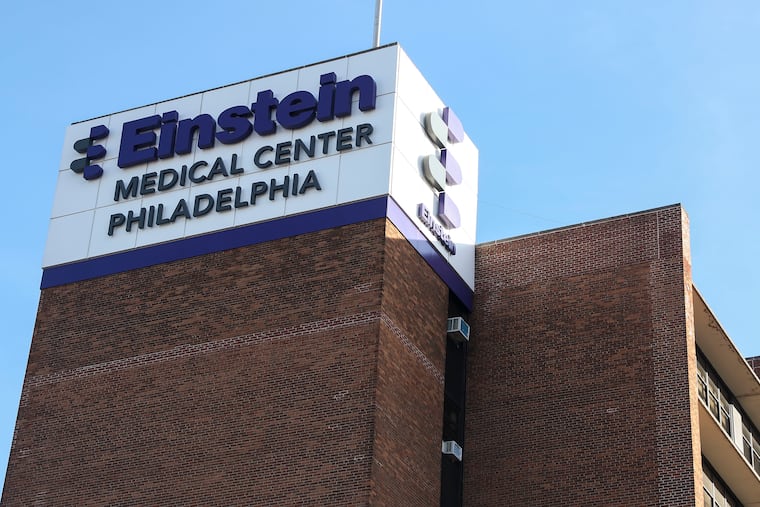Jefferson completes acquisition of Einstein Healthcare Network after three-year wait
The leaders of Jefferson and Einstein said they had no plans for immediate job cuts and that they would take their time integrating Einstein into Jefferson.

Thomas Jefferson University on Monday completed its long-delayed acquisition of Einstein Healthcare Network, adding to Jefferson’s status as the owner of the most hospitals in the Philadelphia region by far. Jefferson now has 18 hospitals, up from 14.
The deal also gives Einstein, a major safety-net provider in North Philadelphia, a chance at greater financial stability, Jefferson and Einstein officials said in interviews last week before an early Monday shooting at Thomas Jefferson University Hospital in Center City led them to cancel celebrations at three Einstein campuses.
While the acquisition has been in the works for more than three years, Einstein and Jefferson officials said the public should not expect any radical changes immediately because of delays caused by an antitrust challenge that didn’t end until March. The challenge of running the health systems during the coronavirus pandemic also slowed progress.
“We’re going to take our time over the next six months or so and really drill through the plans for the clinical and operational businesses and academic businesses to come together,“ said Ken Levitan, Einstein’s president and chief executive officer. Business functions that are not visible to the public, including finance, information technology, and marketing, will be consolidated first. Any job reductions are expected to happen through attrition, he said.
On the clinical side, Levitan said, he expected Jefferson and Einstein to consolidate brain surgery and highly specialized cardiac procedures in fewer locations while maintaining access to those services across the entire system.
The combination of Jefferson and Einstein creates a behemoth with 36,600 employees on a full-time basis, with $7 billion in annual revenue in the fiscal year ended June 30, and with 3,600 hospital beds.
The University of Pennsylvania Health System has about 3,000 beds spread across six hospitals from Princeton to Lancaster County. Penn had $8.7 billion in revenue in fiscal 2021 and 38,000 employees.
Both Einstein and Jefferson would have had operating losses in fiscal 2021 were it not for pandemic aid from the federal government under the CARES Act. Einstein expects to be profitable in the current fiscal year even without more pandemic aid, Levitan said.
Jefferson has grown from three hospitals to 18 since 2015 by acquiring Abington Health, Kennedy Health System, Aria, Magee Rehabilitation Hospital, and a controlling interest in two orthopedic hospitals. Jefferson did not pay for most of those acquisitions, or for Einstein, as is typical between nonprofits.
Jefferson has at least one more deal in the works. That is the purchase of Temple University Health System’s 50% stake in Health Partners Plans Inc., a nonprofit Medicaid insurer also known as HPP.
The price has not been disclosed. Einstein’s former chief executive Barry Freedman said last fall during the antitrust trial that Health Partners was most recently valued in a potential sale at $400 million to $450 million.
After being asked about its targets for profitability over the next three to five years, Jefferson provided a statement: “Our integrated strategic financial plan and targets are expected to enable us to maintain a solid ‘A’ credit rating, fully incorporating Einstein and HPP.”
Standard & Poor’s said in March that it is possible for Jefferson to maintain its “A” credit rating — which affects how much Jefferson has to pay to borrow money — but that it depends on how Jefferson pays for the 50% of HPP that it doesn’t already own and on financial trends at Jefferson and Einstein.
Stephen K. Klasko, Jefferson’s president and chief executive, said last week that the nonprofit will pay for HPP and for the outpatient pavilion it is building on the 1100 block of Chestnut Street with a combination of its own cash, philanthropy, and debt.
As to the future of the combined Jefferson and Einstein, Klasko said that it is the most complex of the mergers Jefferson had undertaken and that management would take the best from both systems.
“We’re really going to try to look at what Einstein does better than us, what we do better than Einstein, what we both do well, and try to teach our students and take care of our patients better than we could individually,” Klasko said. “That’s not meant to be Pollyannaish, but that’s what we plan on doing.”